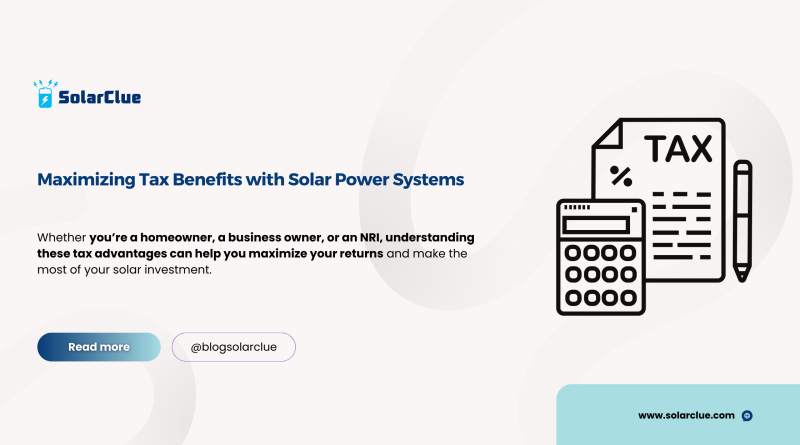Maximizing Tax Benefits with Solar Power Systems
As energy costs rise and sustainability becomes a global priority, solar power systems are gaining traction as a smart and eco-friendly investment. Beyond reducing electricity bills and promoting green living, solar power systems offer significant tax benefits for Indian investors. Whether you’re a homeowner, a business owner, or an NRI, understanding these tax advantages can help you maximize your returns and make the most of your solar investment.
Table of Contents
- 1 The following are the ways to maximize tax benefits with Solar Power Systems:
- 1.1 1. Central Government Subsidies for Residential Solar Systems
- 1.2 Key Points:
- 1.3 2. Accelerated Depreciation for Businesses
- 1.4 Key Points:
- 1.5 3. Benefits Under Section 80-IA
- 1.6 Key Points:
- 1.7 4. GST Benefits on Solar Installations
- 1.8 Key Points:
- 1.9 5. Net Metering and Income Tax Implications
- 1.10 Key Points:
- 1.11 6. Tax Benefits for Non-Resident Indians (NRIs)
- 1.12 Key Points:
- 1.13 7. Loans and Interest Deductions for Solar Investments
- 1.14 Key Points:
- 1.15 How Solar Power Systems Save Taxes and More
- 1.16 Get Expert Guidance with SolarClue
- 1.17 Start Saving Today
The following are the ways to maximize tax benefits with Solar Power Systems:
1. Central Government Subsidies for Residential Solar Systems
The Indian government provides subsidies to encourage the adoption of solar power systems for residential properties. These subsidies effectively reduce the initial cost of installation, making solar more accessible to households.
Key Points:
Subsidy Amount: Up to 40% for systems up to 3 kW and 20% for systems between 3 kW and 10 kW.
Eligibility: Available for grid-connected solar rooftop systems installed by approved vendors.
Impact: These subsidies are not taxed, meaning the savings directly reduce your upfront costs.
2. Accelerated Depreciation for Businesses
For businesses, investing in solar power systems comes with the added advantage of accelerated depreciation under the Income Tax Act. This allows companies to deduct a large portion of the system’s cost in the first few years of installation.
Key Points:
1. Depreciation Rate: Businesses can claim up to 40% depreciation in the first year.
2. Tax Savings: Reduces taxable income, lowering corporate tax liability.
3. Who Can Benefit: Industries, commercial establishments, and SMEs investing in solar systems.
Example:
Installation Cost: ₹10,00,000
Depreciation Deduction (40%): ₹4,00,000
Tax Saved (at 30% corporate tax): ₹1,20,000
3. Benefits Under Section 80-IA
Section 80-IA of the Income Tax Act provides tax holidays for renewable energy projects, including solar power systems. This benefit is particularly useful for large-scale installations by businesses and developers.
Key Points:
Tax Holiday: Profits from solar power generation projects are exempt for 10 consecutive years.
Eligibility: Solar power systems used for commercial purposes, such as solar farms or large-scale rooftop projects.
Impact: Encourages businesses to set up solar power generation units and sell electricity to the grid.
4. GST Benefits on Solar Installations
Solar power systems in India are taxed under a concessional Goods and Services Tax (GST) rate, which helps reduce the overall cost of installation.
Key Points:
GST Rate: 5% on solar components like panels, inverters, and batteries.
Impact: Significantly lower than the standard GST rate of 18%.
Input Tax Credit (ITC): Businesses can claim ITC on GST paid for solar installations, further reducing costs.
5. Net Metering and Income Tax Implications
Under net metering policies, excess electricity generated by solar power systems can be sold back to the grid, creating a secondary income stream. While the income from net metering may be taxable, it is often offset by depreciation benefits and other tax savings.
Key Points:
Income: Earnings from selling excess electricity are considered taxable income.
Offset: Use depreciation benefits to minimize tax liability on this income.
6. Tax Benefits for Non-Resident Indians (NRIs)
NRIs investing in solar power systems in India can enjoy the same tax benefits as residents. Additionally, solar systems installed on properties owned by NRIs can enhance their property value and provide long-term savings.
Key Points:
Eligibility: NRIs qualify for subsidies and tax deductions under Indian law.
Impact: Solar installations can make NRI properties more attractive for resale or rental purposes.
7. Loans and Interest Deductions for Solar Investments
Many banks and financial institutions in India offer green loans for solar power systems at concessional interest rates. In some cases, the interest paid on these loans can be deducted from taxable income.
Key Points:
Loan Type: Priority sector loans for renewable energy projects.
Interest Deduction: Reduces tax liability for businesses using loans to fund solar installations.
How Solar Power Systems Save Taxes and More
| Benefit | Who Can Benefit | Savings/Impact |
|---|---|---|
| Subsidies | Homeowners | Up to 40% off system cost (tax-free). |
| Accelerated Depreciation | Businesses | Claim up to 40% depreciation, reducing taxable income. |
| Section 80-IA Benefits | Commercial solar developers | Tax holiday for 10 years on profits. |
| GST Concessions | All investors | Lower GST rate (5%) reduces system cost. |
| Net Metering Income | Homeowners & Businesses | Additional income stream (offset by depreciation benefits). |
| Loan Interest Deductions | Businesses & Individuals | Reduces tax liability when using loans for solar investments. |
Why Solar Power Is the Smartest Green Investment
Investing in solar power systems offers dual benefits: significant tax savings and long-term reductions in electricity costs. Whether you’re a homeowner looking to save on monthly bills or a business owner seeking corporate tax advantages, solar power systems provide unparalleled financial and environmental returns.
Get Expert Guidance with SolarClue
At SolarClue, we help you maximize your solar investment by offering:
✅ Access to Top Brands like Tata Power Solar, Varistor Solar, and Luminous.
✅ Guidance on Subsidies: Helping you claim the highest eligible discounts.
✅ Personalized Solutions: Tailored to your energy needs and budget.
✅ Hassle-Free Installation: From design to deployment, we handle everything.
Start Saving Today
Don’t miss out on the tax benefits and savings that come with solar power systems. Visit SolarClue to explore high-quality solar solutions and take the first step toward a brighter, greener future.
Invest in solar power—save money, earn returns, and secure a sustainable future! 🌞




